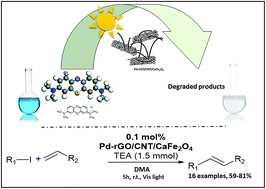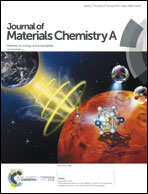Facile synthesis of a recyclable Pd-rGO/CNT/CaFe2O4 nanocomposite with high multifunctional photocatalytic activity under visible light irradiation†
Abstract
We report a facile method to synthesize a magnetically separable Pd-rGO/CNT/CaFe2O4 photocatalyst. The incorporation of CNTs into rGO can form a conductive network structure to bridge the gaps between rGO sheets. This conductive network can prevent the restacking of GO nanosheets during the reduction process. Also, for photocatalysis, the aforementioned conjugated network can provide rapid electronic conducting channels. It was found that the Pd-rGO/CNT/CaFe2O4 nanocomposite is an efficient photocatalyst for the Heck–Mizoroki coupling reaction under irradiation of visible light. Interestingly, the electrons which are excited by the photons can be transferred to the palladium nanoparticles causing an increase in the electron density of Pd, and in consequence increasing the catalytic activity of these nanoparticles in Heck–Mizoroki coupling reactions under visible light. In this regard, we tested the catalytic activity of these nanocomposites in the Heck–Mizoroki coupling reaction under visible light to obtain the product in good to excellent yields. As compared to pure CaFe2O4, rGO/CaFe2O4, and rGO/CNT/CaFe2O4 nanocomposites, the prepared Pd-rGO/CNT/CaFe2O4 photocatalyst exhibits remarkably increased photocatalytic degradation of methylene blue (MB). The Pd nanoparticles can act as a co-catalyst and delay the recombination of photoinduced electron–hole pairs of CaFe2O4.



 Please wait while we load your content...
Please wait while we load your content...